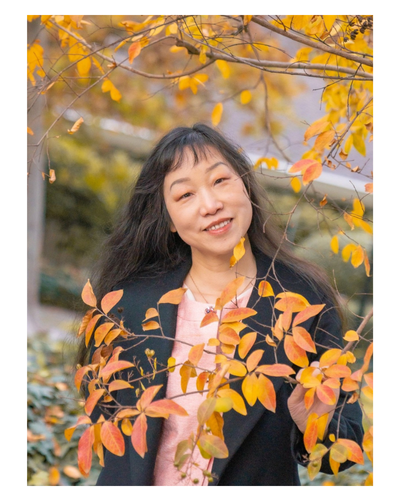
The Power of Giving: PAU Innovart Research Grant Propels Student Research Momentum
 When Maggie Tsai enrolled in Palo Alto University’s Master of Clinical Mental Health Counseling program, she was in the midst of a personal reinvention. A former journalist and public relations professional, Maggie came to PAU seeking not just a degree, but a deeper sense of purpose. What she found here changed the course of her life—and now, she is trying to pay it forward.
When Maggie Tsai enrolled in Palo Alto University’s Master of Clinical Mental Health Counseling program, she was in the midst of a personal reinvention. A former journalist and public relations professional, Maggie came to PAU seeking not just a degree, but a deeper sense of purpose. What she found here changed the course of her life—and now, she is trying to pay it forward.
To honor the education that shaped her path, Maggie established the PAU Innovart Research Grant in 2023 and made additional contributions in 2024. Over a four-year period, the grant will fund up to four counseling students each year across PAU’s MA and PhD programs to support their research efforts.
This spring, the Counseling Department proudly awarded the first three grants to students whose research demonstrates both innovation and impact in the counseling field:
- Steffan Piper (MA in Clinical Mental Health Counseling)
The Hidden Trauma: Undiagnosed Autism and Child Abuse Before ASD Awareness
- Sasha Sosnovskaya (MA in Clinical Mental Health Counseling)
Innovative Technologies in Counselor Education: AI-Simulated Role Play and Adoption-Centered Digital Search Practices - Chitra Thummarukudy (PhD in Counselor Education and Supervision)
Child and Adolescent Counseling Experience Working with Parents/Caregivers
Maggie shared her joy in seeing the grants come to life: “It's exciting that the funds will support vital areas — neurodivergence and trauma, innovative counseling technologies, and child and adolescent counseling — with much of this work benefiting underserved communities.”
Each of these awarded projects represents not only academic promise, but also real-world impact — the kind that can advance understanding, promote equity, and change lives.
A Life Transformed by Education
Maggie’s journey to counseling started with an eight-week mindfulness training in 2018. The experience reshaped her perspective and led her to pursue a Master’s degree in counseling at PAU in 2021.
Her internship at the PAU e-Clinic and Bill Wilson Center also provided her with hands-on training. These experiences helped her integrate theory, reflection, and personal insight into her clinical practice. Today, she works in private practice as an Associate Marriage and Family Therapist, with a focus on Brainspotting and somatic work. She is also pursuing a PhD in Counselor Education and Supervision at PAU.
As she follows her passion, Maggie remains committed to the university that helped shape it.
“The Grant began as a simple expression of gratitude for the solid PAU education that is shaping the second chapter of my life,” she says. “Like a tree whose leaves return to nourish its roots, alumni giving enriches the cycle of growth within the system. In that same spirit, the leaves of research provide vital nutrients for the counseling tree — nurturing new observations, findings, methods, and theories to sprout, take root, and flourish.”
The Ripple Effect of Giving
Maggie’s foundation, Innovart, supports youth mental health and well-being through creative and educational initiatives. Past projects have included teen mindfulness workshops, middle school drama programs, and mental health talks for parents and adolescents. But the PAU Innovart Research Grant marks a uniquely personal form of giving — one that directly uplifts students in the very field where Maggie first heard her calling.
Her hope is that this grant sparks a positive cycle — where PAU students produce influential research, enrich lives, and carry forward the spirit of giving.
“It is exciting to imagine how this Grant, in its modest way, can support PAU as it stands strong and resilient in the forest of mental health education.”
Maggie also emphasizes that giving doesn’t have to be large to be meaningful. Whether it’s a donation, mentorship, time, or simply sharing one’s journey — each act helps sustain the ecosystem of education and healing.
“After graduation, the bond can continue through our small deeds,” she says. “Little deeds are the perpetual power that gets the ball rolling.”
Thanks to Maggie Tsai, that ball is rolling — and gaining momentum. Her generosity is not only opening doors for student researchers but also reminding the entire PAU community of the power of gratitude, purpose, and giving back.
Join the Cycle of Impact
Maggie Tsai’s gift is a powerful reminder that one act of generosity can create a ripple effect—empowering students, advancing the field, and strengthening the PAU community for years to come. Her story is not just one of gratitude, but of momentum.
Philanthropy at PAU isn’t about grand gestures—it’s about meaningful ones. Every gift, no matter the size, helps equip the next generation of mental health professionals with the tools, experiences, and opportunities to serve others. Just as Maggie's leaves have returned to nourish her roots, so too can your contribution feed the future of counseling.
Be part of the cycle.
Support PAU students. Advance the field. Create change.
To learn more about how you can make an impact through student support, named funds, or legacy giving, contact the Office of Alumni Relations
